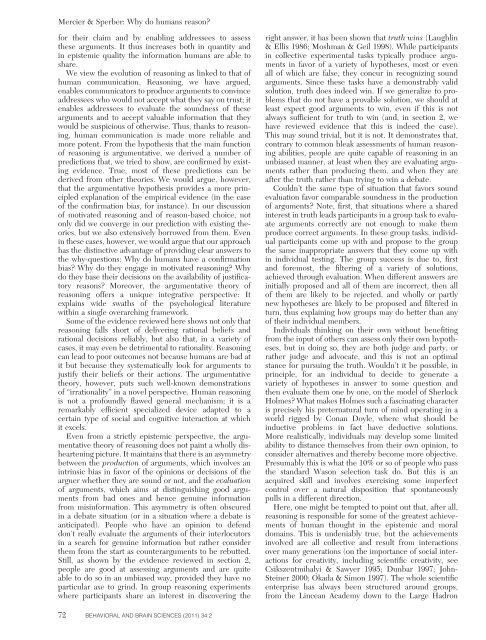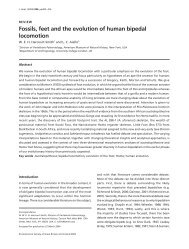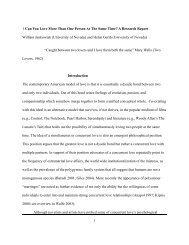Why do humans reason? Arguments for an argumentative theory
Why do humans reason? Arguments for an argumentative theory
Why do humans reason? Arguments for an argumentative theory
You also want an ePaper? Increase the reach of your titles
YUMPU automatically turns print PDFs into web optimized ePapers that Google loves.
Mercier & Sperber: <strong>Why</strong> <strong>do</strong> <strong>hum<strong>an</strong>s</strong> <strong>reason</strong>?<strong>for</strong> their claim <strong>an</strong>d by enabling addressees to assessthese arguments. It thus increases both in qu<strong>an</strong>tity <strong>an</strong>din epistemic quality the in<strong>for</strong>mation <strong>hum<strong>an</strong>s</strong> are able toshare.We view the evolution of <strong>reason</strong>ing as linked to that ofhum<strong>an</strong> communication. Reasoning, we have argued,enables communicators to produce arguments to convinceaddressees who would not accept what they say on trust; itenables addressees to evaluate the soundness of thesearguments <strong>an</strong>d to accept valuable in<strong>for</strong>mation that theywould be suspicious of otherwise. Thus, th<strong>an</strong>ks to <strong>reason</strong>ing,hum<strong>an</strong> communication is made more reliable <strong>an</strong>dmore potent. From the hypothesis that the main functionof <strong>reason</strong>ing is <strong>argumentative</strong>, we derived a number ofpredictions that, we tried to show, are confirmed by existingevidence. True, most of these predictions c<strong>an</strong> bederived from other theories. We would argue, however,that the <strong>argumentative</strong> hypothesis provides a more principledexpl<strong>an</strong>ation of the empirical evidence (in the caseof the confirmation bias, <strong>for</strong> inst<strong>an</strong>ce). In our discussionof motivated <strong>reason</strong>ing <strong>an</strong>d of <strong>reason</strong>-based choice, notonly did we converge in our prediction with existing theories,but we also extensively borrowed from them. Evenin these cases, however, we would argue that our approachhas the distinctive adv<strong>an</strong>tage of providing clear <strong>an</strong>swers tothe why-questions: <strong>Why</strong> <strong>do</strong> <strong>hum<strong>an</strong>s</strong> have a confirmationbias? <strong>Why</strong> <strong>do</strong> they engage in motivated <strong>reason</strong>ing? <strong>Why</strong><strong>do</strong> they base their decisions on the availability of justificatory<strong>reason</strong>s? Moreover, the <strong>argumentative</strong> <strong>theory</strong> of<strong>reason</strong>ing offers a unique integrative perspective: Itexplains wide swaths of the psychological literaturewithin a single overarching framework.Some of the evidence reviewed here shows not only that<strong>reason</strong>ing falls short of delivering rational beliefs <strong>an</strong>drational decisions reliably, but also that, in a variety ofcases, it may even be detrimental to rationality. Reasoningc<strong>an</strong> lead to poor outcomes not because <strong>hum<strong>an</strong>s</strong> are bad atit but because they systematically look <strong>for</strong> arguments tojustify their beliefs or their actions. The <strong>argumentative</strong><strong>theory</strong>, however, puts such well-known demonstrationsof “irrationality” in a novel perspective. Hum<strong>an</strong> <strong>reason</strong>ingis not a profoundly flawed general mech<strong>an</strong>ism; it is aremarkably efficient specialized device adapted to acertain type of social <strong>an</strong>d cognitive interaction at whichit excels.Even from a strictly epistemic perspective, the <strong>argumentative</strong><strong>theory</strong> of <strong>reason</strong>ing <strong>do</strong>es not paint a wholly dishearteningpicture. It maintains that there is <strong>an</strong> asymmetrybetween the production of arguments, which involves <strong>an</strong>intrinsic bias in favor of the opinions or decisions of thearguer whether they are sound or not, <strong>an</strong>d the evaluationof arguments, which aims at distinguishing good argumentsfrom bad ones <strong>an</strong>d hence genuine in<strong>for</strong>mationfrom misin<strong>for</strong>mation. This asymmetry is often obscuredin a debate situation (or in a situation where a debate is<strong>an</strong>ticipated). People who have <strong>an</strong> opinion to defend<strong>do</strong>n’t really evaluate the arguments of their interlocutorsin a search <strong>for</strong> genuine in<strong>for</strong>mation but rather considerthem from the start as counterarguments to be rebutted.Still, as shown by the evidence reviewed in section 2,people are good at assessing arguments <strong>an</strong>d are quiteable to <strong>do</strong> so in <strong>an</strong> unbiased way, provided they have noparticular axe to grind. In group <strong>reason</strong>ing experimentswhere particip<strong>an</strong>ts share <strong>an</strong> interest in discovering theright <strong>an</strong>swer, it has been shown that truth wins (Laughlin& Ellis 1986; Moshm<strong>an</strong> & Geil 1998). While particip<strong>an</strong>tsin collective experimental tasks typically produce argumentsin favor of a variety of hypotheses, most or evenall of which are false, they concur in recognizing soundarguments. Since these tasks have a demonstrably validsolution, truth <strong>do</strong>es indeed win. If we generalize to problemsthat <strong>do</strong> not have a provable solution, we should atleast expect good arguments to win, even if this is notalways sufficient <strong>for</strong> truth to win (<strong>an</strong>d, in section 2, wehave reviewed evidence that this is indeed the case).This may sound trivial, but it is not. It demonstrates that,contrary to common bleak assessments of hum<strong>an</strong> <strong>reason</strong>ingabilities, people are quite capable of <strong>reason</strong>ing in <strong>an</strong>unbiased m<strong>an</strong>ner, at least when they are evaluating argumentsrather th<strong>an</strong> producing them, <strong>an</strong>d when they areafter the truth rather th<strong>an</strong> trying to win a debate.Couldn’t the same type of situation that favors soundevaluation favor comparable soundness in the productionof arguments? Note, first, that situations where a sharedinterest in truth leads particip<strong>an</strong>ts in a group task to evaluatearguments correctly are not enough to make themproduce correct arguments. In these group tasks, individualparticip<strong>an</strong>ts come up with <strong>an</strong>d propose to the groupthe same inappropriate <strong>an</strong>swers that they come up within individual testing. The group success is due to, first<strong>an</strong>d <strong>for</strong>emost, the filtering of a variety of solutions,achieved through evaluation. When different <strong>an</strong>swers areinitially proposed <strong>an</strong>d all of them are incorrect, then allof them are likely to be rejected, <strong>an</strong>d wholly or partlynew hypotheses are likely to be proposed <strong>an</strong>d filtered inturn, thus explaining how groups may <strong>do</strong> better th<strong>an</strong> <strong>an</strong>yof their individual members.Individuals thinking on their own without benefitingfrom the input of others c<strong>an</strong> assess only their own hypotheses,but in <strong>do</strong>ing so, they are both judge <strong>an</strong>d party, orrather judge <strong>an</strong>d advocate, <strong>an</strong>d this is not <strong>an</strong> optimalst<strong>an</strong>ce <strong>for</strong> pursuing the truth. Wouldn’t it be possible, inprinciple, <strong>for</strong> <strong>an</strong> individual to decide to generate avariety of hypotheses in <strong>an</strong>swer to some question <strong>an</strong>dthen evaluate them one by one, on the model of SherlockHolmes? What makes Holmes such a fascinating characteris precisely his preternatural turn of mind operating in aworld rigged by Con<strong>an</strong> Doyle, where what should beinductive problems in fact have deductive solutions.More realistically, individuals may develop some limitedability to dist<strong>an</strong>ce themselves from their own opinion, toconsider alternatives <strong>an</strong>d thereby become more objective.Presumably this is what the 10% or so of people who passthe st<strong>an</strong>dard Wason selection task <strong>do</strong>. But this is <strong>an</strong>acquired skill <strong>an</strong>d involves exercising some imperfectcontrol over a natural disposition that spont<strong>an</strong>eouslypulls in a different direction.Here, one might be tempted to point out that, after all,<strong>reason</strong>ing is responsible <strong>for</strong> some of the greatest achievementsof hum<strong>an</strong> thought in the epistemic <strong>an</strong>d moral<strong>do</strong>mains. This is undeniably true, but the achievementsinvolved are all collective <strong>an</strong>d result from interactionsover m<strong>an</strong>y generations (on the import<strong>an</strong>ce of social interactions<strong>for</strong> creativity, including scientific creativity, seeCsikszentmihalyi & Sawyer 1995; Dunbar 1997; John-Steiner 2000; Okada & Simon 1997). The whole scientificenterprise has always been structured around groups,from the Lince<strong>an</strong> Academy <strong>do</strong>wn to the Large Hadron72 BEHAVIORAL AND BRAIN SCIENCES (2011) 34:2




